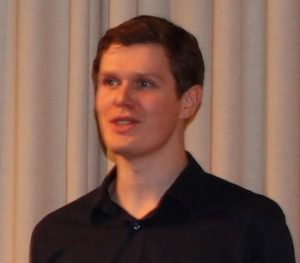At the group meeting on 13th January Dr David Harris-Birtill gave a talk about ongoing work creating an automated remote pulse oximeter.
Here’s an abstract about this work which was presented at a recent conference in India:
“A patient’s blood oxygen saturation and heart rate are crucial indicators for monitoring their wellbeing; standard practice is to use a finger clip pulse oximeter, creating practical constraints on when and how these measurements are taken. Using multispectral imaging cameras, oxygen saturation and heart rate can be measured remotely, and without contact sensors. However, these devices are both expensive and lack the ability to accurately locate the body within the image. This project addresses these problems, creating and testing a prototype for a reliable, low cost system using a widely available camera normally used to control a gaming device, providing both colour and co-registered infrared images. The camera images are then used for remote sensing of oxygen saturation and heart rate for up to six people simultaneously.
Continue reading






